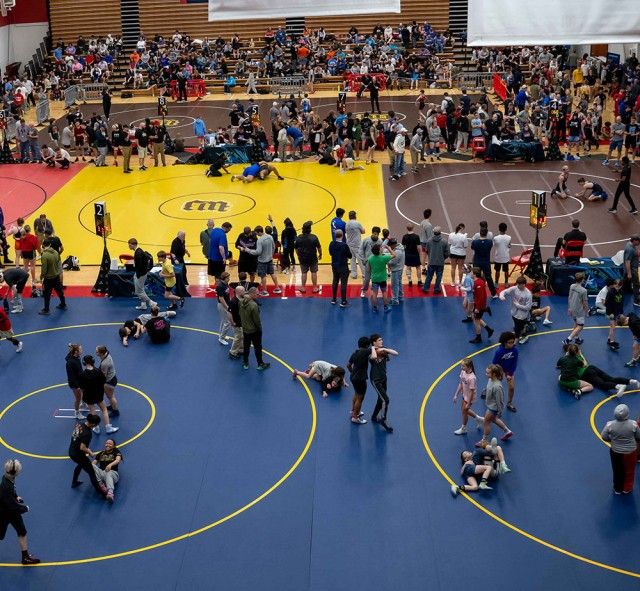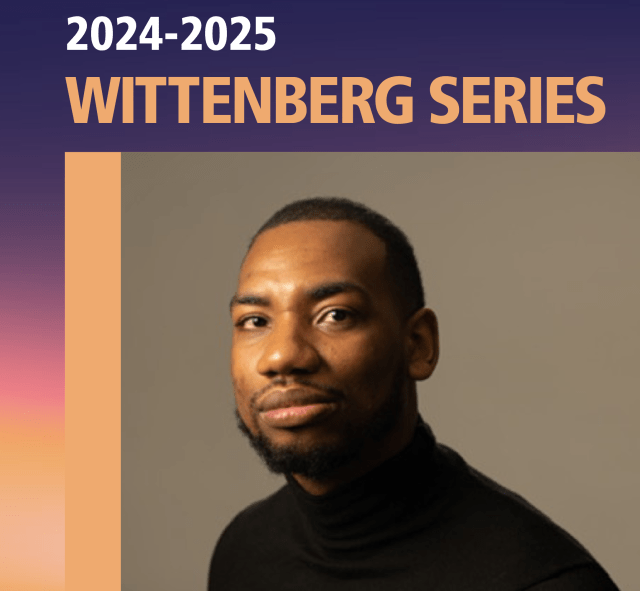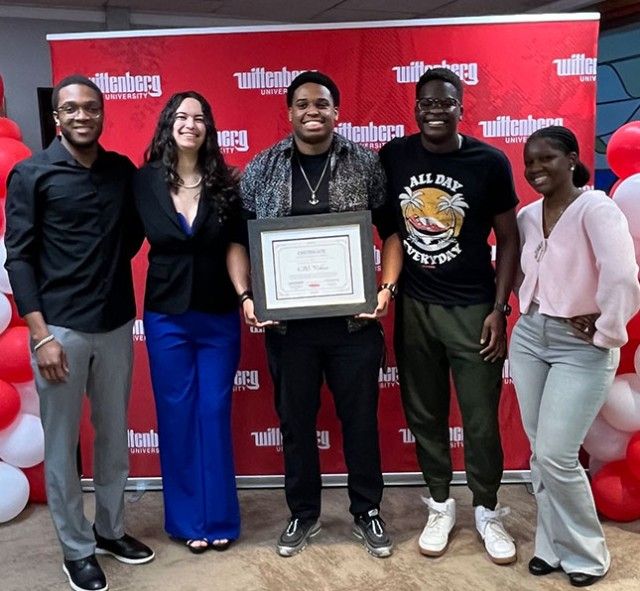Looking for the optimal combination of experience, skill, and interest to lead the newly named Margaret Ermarth Institute for the Public Humanities, Wittenberg recently announced that Christian Raffensperger will now lead the institute following the departure of Nancy McHugh, former professor of philosophy at the University.
An internationally recognized scholar, Raffensperger, Kenneth E. Wray Endowed Chair in the Humanities, professor of history, and department chair, brings a distinguished record of publication in the humanities, specifically in history, to his new role. He also has experience working with other humanities scholars on public-facing scholarship.
During the spring semester of the 2021-2022 academic year, Raffensperger served as a resident fellow at the National Humanities Center in Durham, North Carolina, with other scholars from across the humanities and from around the world. It was the second fellowship of this kind that he has had; his first was as the Eugene and Daymel Shklar Research Fellow at the Harvard Ukrainian Research Institute in 2013. Most recently, he has been able to share his vast knowledge of Russian and Ukrainian history to offer context and background on the ongoing conflict in Ukraine.
“I am very excited to take on this role and direct the Margaret Ermarth Institute for the Public Humanities,” he said. “Being a fellow at the National Humanities Center really opened my eyes to all the things that a scholar like myself can be doing in my own community to advance the humanities. So, upon my return home, I lobbied to direct the Institute and luckily the administration agreed. Our main goal is to take the important work of learning and educating being done on Wittenberg’s campus and bring it into the community.
“I would really like the Institute to focus on the Springfield and Clark County community. We can take the humanities out of the classroom and off campus and situate them in the community as a whole,” Raffensperger explained. “The humanities are not pursuits for elites or ‘ivory tower intellectuals’ but are important parts of our daily, human, experience.”
Raffensperger has many ideas for the institute and begins his role by paying homage to Margaret Ermarth, the late, highly beloved Wittenberg history professor, by naming the institute after her.
The original name was Wittenberg’s Institute for Public Humanities and Sciences.
“When I took over the Institute, I knew I wanted to change the name,” Raffensperger said. “Margaret Ermarth was a foundational figure in Wittenberg history of the mid-twentieth century. She was the first female member of the history department and our first female emerita member. She was the first winner of what is now the Alumni Association Award for Distinguished Teaching. After her untimely death, the University commemorated her by naming the Synod-Leamer complex the ‘Margaret Ermarth Center for the Humanities.’ However, when Hollenbeck Hall was built, and the humanities moved in there in 2000, the name was lost, except for a sign in the third floor Hollenbeck atrium. Bringing her name back as part of the institute is a way to reconnect with a figure from Wittenberg's past who valued and prized the humanities and shows our own honor to this discipline.”
Founded to connect the mission of Wittenberg University with actions in the world, the institute will focus locally on Springfield, and Clark County, as well as southern Ohio in general.
“My experiences have made it clear to me that we, Wittenberg faculty, need to continue to engage with our Springfield and Clark County neighbors,” Raffensperger said. “The Institute’s core tenet is that the site of learning is not always in the classroom nor on campus. Human beings are learners; education and knowledge are acquired in diverse places across our lives. This is a big reason that the Institute has partnered with the Clark County Public Library to host our Knowledge Shared events at its main branch. Similarly, we are partnering with United Senior Services to make our offerings part of their Springfield Area Institute for Lifelong Learning (SAILL) program.”
Earning his B.A. from Bates College in Lewiston, Maine, and his M.A. and Ph.D. from the University of Chicago, Raffensperger is the author of four books and is active in multiple scholarly organizations. He has recently served on the governing board of the Byzantine Studies Association of North America and the board for the Ohio Academy of History. He is also a founding member of the editorial board for the journal, The Medieval Globe. The Medieval Globe's goal is to bring scholarly interconnectivity to a modern understanding of the medieval world.
Raffensperger’s interests are in Russian and Central Eurasian studies and premodern and ancient world studies. He currently has two additional books, one co-authored, and the other in process. He has edited or co-edited three books, with another under contract with Routledge Press, and yet another proposed to Routledge. He has also edited one and co-edited another issue of the journal Russian History/Histoire Russe. He has received numerous research fellowships and has been an associate member of the Harvard Ukrainian Research Institute since 2014. He has more than 25 articles in recognized scholarly journals and/or book chapter contributions, either published, forthcoming or in process.
The institute will complement the work of Wittenberg’s Susan Hirt Hagen Center for Civic and Urban Engagement in providing a combination of experiential learning and community engagement. The Institute looks to offer a variety of activities for the community, from Humanities Thrives interviews to Knowledge Shared discussions, which will bring the University community and the Springfield/Clark County community together in the pursuit of knowledge and learning. Raffensperger already has events scheduled for fall 2022.
Included in the event offerings are two professional development opportunities for secondary school teachers per year, one in the fall and one in the spring. These learning options will offer Continuing Education Credits (CEUs), which can be applied to a school district’s requirements for continuing education. These are free and open to any teachers in the area. Sessions will be in person, held at Wittenberg, and taught by University faculty. Each seminar will require approximately 2.5 hours of pre-work (typically readings assigned by the faculty member leading the seminar), and the seminar itself will be 90 minutes, leading to a total of five hours of CEU for each participant.
The first professional development opportunity will be presented by Raffensperger on the history of Ukraine and the current Ukraine war. He has written and spoken numerous times on the conflict, for national and international audiences, and brings to bear more than a decade of experience working on the history of eastern Europe. The seminar will attempt to provide answers to common questions about the war and its origins, as well as a discussion regarding how to present those ideas in the classroom, in a way that makes sense to students.
For Spring 2023, Molly Wood, professor of history at Wittenberg specializing in modern U.S. and diplomatic history, will be offering a professional development seminar on teaching 9/11. Wood has worked extensively with the newest scholarship on the 9/11 terrorist attack itself, the commission report, and the way that the attack has shaped American society in the 21st century. Given that students today are growing up in the post-9/11 world, without having been alive for the event, this seminar will help educators understand the newest work on the subject, as well as how to teach a sensitive subject in a way that enlightens the students without adding to their trauma.
Following its core tenet of shifting the site of education into the community, the institute will offer the Knowledge Shared series in which faculty from Wittenberg share their expertise on topics of interest to the Springfield and Clark County Community. Co-sponsored by the Clark County Public Library, where all of the activities will be based, and SAILL, the series will first feature Staci Rhine, professor of political science. Her topic will focus on the media’s influence on elections, as the upcoming midterms occur in November. This talk will take place at the Gaier Room of the Clark County Public Library in October.
For more on the institute, click here.







